Completing a DUI treatment program demonstrates accountability and commitment to rehabilitation. This significantly improves employment prospects for individuals with alcohol-related convictions. Research shows that job applicants who proactively address their DUI through counseling are 40-60% more likely to receive favorable hiring consideration compared to those who simply fulfill minimum legal requirements.
Key Takeaways
- DUI treatment program completion shows employers you take responsibility for past mistakes and are committed to maintaining sobriety in the workplace.
- Many employers conduct background checks that reveal DUI convictions, but documented rehabilitation efforts can mitigate negative hiring decisions.
- Certain industries and professional licenses have mandatory alcohol treatment requirements following a DUI conviction.
- Court-ordered programs typically require 12-52 weeks of participation, while voluntary programs offer flexible scheduling options for working professionals.
- Transportation, healthcare, education, and positions requiring professional licenses face stricter scrutiny for DUI convictions.
- Completing treatment before applying for jobs allows you to address the conviction proactively during interviews rather than defensively.
- Employers legally cannot discriminate based solely on arrest records, but convictions may be considered if job-related.
- Documentation from treatment providers, including certificates of completion and progress reports, serves as tangible evidence of rehabilitation.
- Some states offer record sealing or expungement after successful treatment completion, potentially removing the DUI from employment background checks.
Understanding DUI Treatment Programs and Employment Requirements
DUI rehabilitation programs serve dual purposes in the employment context. First, they satisfy legal obligations. Second, they demonstrate personal accountability to potential employers. These structured interventions range from educational classes to intensive outpatient therapy.
The type and duration of the program required depends on several factors. These include conviction severity, blood alcohol content at arrest, prior offenses, and state-specific regulations. Many treatment facilities offer evening and weekend sessions specifically designed for individuals maintaining job responsibilities during rehabilitation.
Standard programs include risk assessment evaluations, group counseling sessions, and individual therapy appointments. They also feature ongoing monitoring components that typically span three to twelve months. A 2024 Society for Human Resource Management survey found that 67% of HR professionals view documented rehabilitation efforts favorably when evaluating candidates with DUI convictions.
How DUI Convictions Impact Job Applications and Background Checks
Most employers conduct criminal background checks as standard hiring practice. According to Professional Background Screening Association data, 94% of companies screen at least some positions. DUI convictions typically appear on these reports for seven to ten years.
The Fair Credit Reporting Act requires employers to obtain written consent before conducting background checks. It also mandates specific procedures if they decide not to hire based on conviction history. Background check impacts vary significantly by industry and position type.
| Background Check Component | DUI Impact Duration | Employment Considerations |
| Criminal history report | 7-10 years (varies by state) | Appears on most standard checks |
| Driving record check | 3-10 years (state-dependent) | Critical for driving positions |
| Professional license verification | Permanent record with board | May require rehabilitation proof |
| Federal employment screening | Lifetime for certain positions | Enhanced scrutiny for government roles |
Program completion documentation provides concrete evidence when discussing convictions with potential employers. Many hiring managers specifically request this documentation when evaluating candidates with alcohol-related convictions.
Types of DUI Rehabilitation Programs That Employers Value
Court-mandated programs represent the baseline legal requirement following DUI convictions in most jurisdictions. These structured interventions address alcohol education, impaired driving consequences, and relapse prevention. The type of program you complete significantly influences how employers evaluate your rehabilitation commitment.
Treatment program options include:
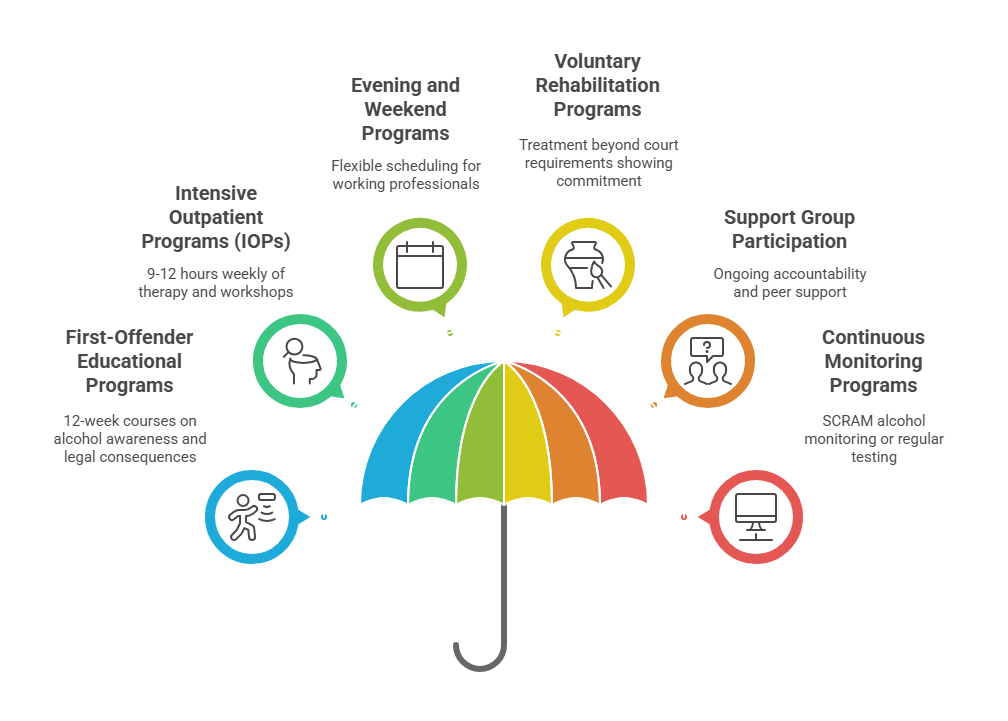
- First-offender educational programs: 12-week courses covering alcohol awareness, legal consequences, and risk assessment for individuals with no prior convictions.
- Intensive outpatient programs (IOPs): 9-12 hours weekly of group therapy, individual counseling, and educational workshops for comprehensive treatment.
- Evening and weekend programs: Flexible scheduling designed for working professionals to maintain employment during rehabilitation.
- Voluntary rehabilitation programs: Treatment beyond court requirements demonstrating exceptional initiative and genuine commitment to sobriety.
- Support group participation: Alcoholics Anonymous or similar programs providing ongoing accountability and peer support.
- Continuous monitoring programs: SCRAM alcohol monitoring or regular testing showing sustained sobriety commitment.
Voluntary rehabilitation programs demonstrate exceptional initiative to potential employers. Documentation from voluntary programs provides powerful evidence of rehabilitation when discussing employment qualifications.
Professional Licensing Requirements After DUI Convictions
Professional licensing boards maintain strict standards regarding alcohol-related convictions. Specific rehabilitation requirements vary by profession and state. Healthcare professionals including nurses, physicians, pharmacists, and emergency medical technicians face particularly rigorous scrutiny due to patient safety responsibilities.
Most state medical boards require immediate reporting of DUI convictions followed by evaluation to determine fitness for continued practice. Treatment program completion, ongoing monitoring agreements, and periodic compliance reporting typically constitute minimum requirements for license retention. Legal professionals encounter similar licensing challenges following DUI convictions, with state bar associations evaluating alcohol-related offenses under character and fitness standards.
| Professional License Type | Typical DUI Response | Rehabilitation Requirements |
| Nursing (RN/LPN) | Immediate board reporting | Substance abuse evaluation, treatment completion, monitoring agreement (2-5 years) |
| Medical Doctor (MD/DO) | Fitness evaluation | Comprehensive assessment, treatment program, ongoing testing, practice monitoring |
| Attorney/Legal Professional | Character and fitness review | Treatment documentation, lawyer assistance program, ethics course |
| Commercial Driver's License | Automatic suspension period | DUI school completion, SR-22 insurance, retesting requirements |
| Teaching Credential | Possible suspension | Rehabilitation evidence, moral fitness evaluation, probationary period |
| Financial/Securities License | Disclosure requirement | Treatment completion, compliance monitoring, enhanced supervision |
License reinstatement processes require substantial documentation of rehabilitation efforts. Professional license attorneys recommend exceeding minimum treatment requirements when possible to strengthen reinstatement applications.
Education and Financial Services License Considerations
Education, financial services, and real estate licensing boards impose specific requirements following alcohol convictions. Teachers may face credential suspension pending rehabilitation verification. Securities professionals must disclose convictions to FINRA and provide treatment documentation for continued registration.
Real estate licensees in most states must report DUI convictions within specified timeframes. Licensing boards evaluate rehabilitation evidence when determining disciplinary action. Comprehensive documentation strengthens reinstatement applications and demonstrates genuine commitment to recovery.
Industries and Positions Most Affected by DUI Convictions
Transportation and logistics industries maintain the strictest DUI-related employment restrictions due to federal safety regulations. Commercial motor vehicle operators face automatic disqualification periods following alcohol-related convictions. Even after disqualification periods expire, many companies refuse to hire drivers with recent DUI histories.
Employment sectors with heightened DUI scrutiny:
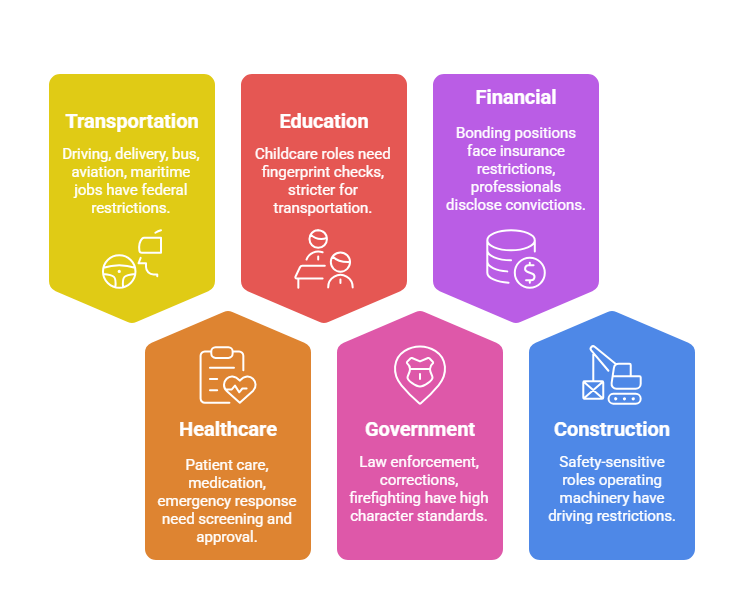
- Transportation and logistics: Commercial driving, delivery services, bus operations, aviation, maritime work face federal restrictions and automatic disqualification periods.
- Healthcare and medical services: Positions involving patient care, medication administration, emergency response require enhanced background screening and licensing board approval.
- Education and childcare: Roles working with children require fingerprint-based checks, with stricter standards for positions involving student transportation or overnight supervision.
- Government and public safety: Law enforcement, corrections, firefighting, emergency services maintain elevated character standards with limited tolerance for alcohol convictions.
- Financial services: Positions requiring bonding face insurance restrictions, while licensed professionals must disclose convictions to regulatory authorities.
- Construction and equipment operation: Safety-sensitive roles operating heavy machinery face restrictions similar to commercial driving positions.
Healthcare employment faces significant challenges given patient safety responsibilities and controlled substance access. Positions involving patient transport, emergency response, or medication administration receive particular scrutiny, though employers often distinguish between isolated incidents with completed rehabilitation versus patterns of behavior.
Creating an Employment Action Plan After DUI Treatment

Developing a strategic employment approach maximizes the benefits of completed DUI rehabilitation programs. Begin by obtaining comprehensive documentation from your treatment provider. Request specific letters addressing employment concerns that emphasize skills developed during treatment.
Essential action steps include:
- Gather complete documentation: Certificates of completion, attendance records, progress reports, and counselor recommendation letters from all treatment programs.
- Research industry requirements: Understand licensing, safety-sensitive duty restrictions, and conviction consideration practices in your target field.
- Establish sobriety timeline: Complete all treatment requirements and demonstrate 6-12 months of sustained recovery before major job transitions.
- Build professional portfolio: Organize documentation in accessible format for job applications and interviews.
- Develop disclosure strategy: Prepare concise explanation emphasizing accountability, rehabilitation, and lessons learned.
- Target receptive employers: Research companies with second-chance hiring initiatives or diversity commitments.
Timing significantly impacts employment outcomes following DUI convictions. When possible, establish a period of demonstrated sobriety before actively pursuing new positions to demonstrate sustained recovery and gather additional positive documentation.
Building Supporting Documentation for Employment Applications
Comprehensive documentation transforms abstract claims about rehabilitation into concrete evidence employers can evaluate. Request official completion certificates from all treatment programs attended, ensuring these documents include program names, completion dates, total hours completed, and any special recognitions earned. Many licensed treatment facilities provide employment-specific letters at participant request.
Progress reports and evaluation letters from treatment counselors add personal context by addressing specific behavioral changes, skill development, and sustained commitment. Request that counselors emphasize workplace-relevant improvements such as stress management, decision-making, accountability, and interpersonal skills since treatment professionals typically provide supportive documentation when participants make specific requests.
Resume and Application Strategies
Focus on skills and achievements rather than drawing attention to gaps requiring explanation. Emphasize professional accomplishments, technical skills, and work history throughout your resume materials. If treatment required work interruptions, briefly explain time away as "personal development" without specifically mentioning DUI on written applications.
Understand what criminal history questions legally require disclosure versus those you may answer strategically. Prepare your explanation in advance by developing a brief, honest explanation that emphasizes lessons learned, rehabilitation completed, and current commitment to responsibility.
Legal Protections and Employer Obligations in Hiring Decisions
The Fair Credit Reporting Act provides specific protections when employers use background check information in hiring decisions. Companies must obtain written authorization before conducting criminal background checks and provide candidates with pre-adverse action notices if conviction information may lead to rejection. This process requires giving candidates copies of their background reports and allowing reasonable time to dispute inaccuracies.
Title VII of the Civil Rights Act of 1964 prohibits employment discrimination based on protected characteristics. Equal Employment Opportunity Commission guidance addresses criminal conviction considerations. Employers cannot categorically exclude all applicants with conviction histories without demonstrating job-related necessity and business justification.
Key legal protections for job applicants:
- FCRA pre-adverse action requirements: Employers must provide background report copies and allow dispute opportunities before rejecting candidates based on conviction information.
- EEOC individualized assessment standards: Hiring decisions must consider offense nature, time elapsed, and rehabilitation evidence rather than blanket exclusions.
- Ban-the-box laws: Over 35 states prohibit conviction questions on initial applications, delaying inquiries until after preliminary interviews.
- State-specific protections: Some states restrict consideration of offenses after specified periods or offer expungement eligibility for first-time offenders.
- Professional license appeals: Licensing boards must follow due process procedures when evaluating fitness to practice after alcohol convictions.
State-specific ban-the-box laws further protect job applicants by regulating when employers may inquire about convictions. These laws typically delay background checks until after preliminary interviews or conditional job offers.
When and How to Disclose DUI Convictions to Employers
Strategic disclosure timing significantly affects employment outcomes for individuals with DUI convictions. Legal requirements vary by jurisdiction and application format, with some states prohibiting conviction questions on initial applications while others allowing inquiries at any stage. Review application documents carefully to determine specific disclosure obligations.
Most career advisors recommend proactive disclosure during face-to-face interviews when legally permissible. This approach allows you to provide context, emphasize rehabilitation, and demonstrate accountability through personal interaction. Effective disclosure focuses on accountability, rehabilitation, and lessons learned rather than excuses or minimization.
Long-term Career Recovery Strategies After DUI Treatment
Building a positive post-treatment track record creates distance from DUI convictions over time. Focus on establishing consistent employment history, maintaining clean legal records, and documenting continued personal development. Each year without incidents reduces the conviction's employment impact, with most employers placing significantly less weight on offenses after 3-5 years.
Career recovery strategies include:
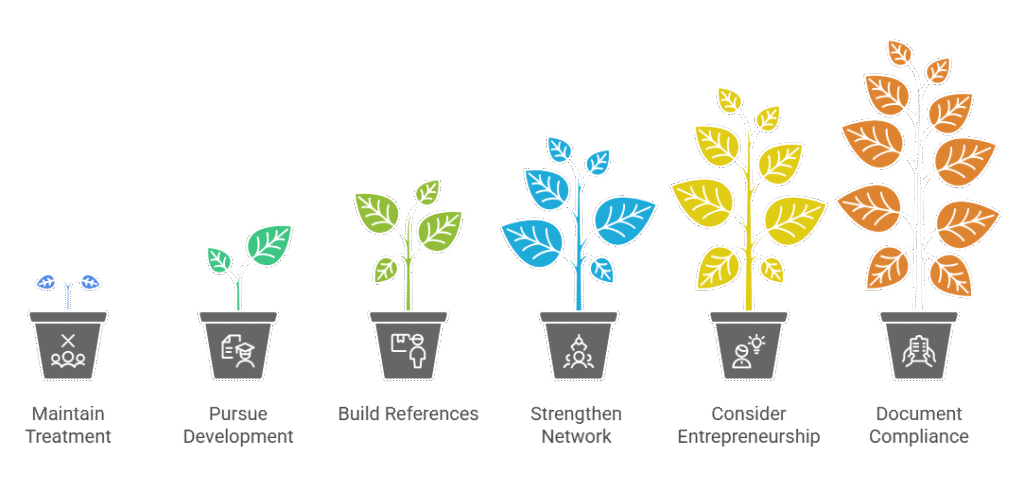
- Maintain treatment connections: Participate in aftercare programs and support groups providing ongoing accountability and demonstrating sustained recovery commitment.
- Pursue professional development: Obtain industry certifications, complete continuing education, join professional associations, and develop new skills showing forward progress.
- Build diverse references: Develop professional references from supervisors, colleagues, treatment providers, and community organizations speaking to different character aspects.
- Strengthen professional network: Attend industry events, join organizations, volunteer in your field, and build relationships with colleagues vouching for current capabilities.
- Consider entrepreneurship: Self-employment removes some background check barriers, though professional licensing requirements still apply in regulated fields.
- Document ongoing compliance: Maintain records of completed probation, continued sobriety, clean driving records, and sustained law-abiding behavior.
Networking becomes especially valuable for individuals with conviction histories since personal recommendations often overcome background concerns. Many successful job placements result from personal referrals rather than traditional application processes.
Employer Perspectives on Hiring Candidates with DUI Treatment History
Human resource professionals balance multiple concerns when evaluating candidates with DUI convictions. These include liability risks, workplace safety, company reputation, and legal compliance obligations. Understanding these perspectives helps job seekers address employer concerns effectively.
Liability represents a primary consideration, particularly for positions involving driving, safety-sensitive duties, or client interaction. Companies fear negligent hiring claims if employees with known risk factors cause workplace incidents, making documented rehabilitation essential for demonstrating due diligence.
Treatment completion significantly improves employer risk assessments by demonstrating accountability and reduced recidivism likelihood. HR professionals report that candidates who proactively completed rehabilitation beyond minimum legal requirements stand out positively compared to those who simply fulfilled court obligations.
Industry-Specific Rehabilitation Requirements and Best Practices
Transportation sector rehabilitation requirements exceed those in most other industries due to Department of Transportation regulations governing safety-sensitive positions. The Federal Motor Carrier Safety Administration mandates substance abuse professional evaluations, treatment program completion, return-to-duty testing, and ongoing follow-up testing. These requirements apply regardless of employer preferences, creating uniform national standards.
Professional field requirements vary significantly:
- Transportation workers: DOT-mandated SAP evaluations, return-to-duty testing, ongoing monitoring for commercial drivers, pilots, and maritime workers before resuming safety-sensitive duties.
- Healthcare professionals: State monitoring program participation, alternative-to-discipline agreements, regular drug testing, workplace supervision, and continuing education about substance abuse.
- Education employees: Fitness-for-duty evaluations, district legal counsel consultations, consideration of position type, time elapsed, and overall employment record.
- Legal professionals: State bar lawyer assistance programs, confidential support and monitoring, ethics courses, and periodic compliance reporting to bar associations.
- Financial service workers: Enhanced background screening, disclosure to FINRA or other regulators, compliance monitoring, and sometimes enhanced workplace supervision.
Healthcare industry rehabilitation involves both employer policies and professional licensing board requirements. Many facilities require employees to participate in alternative-to-discipline programs or health professional monitoring agreements following alcohol-related incidents to maintain employment and licensure.
Maintaining Employment During DUI Treatment
Many employers offer Employee Assistance Programs (EAPs) that provide confidential support for workers addressing substance abuse issues. These programs can coordinate DUI treatment with workplace accommodations, helping employees maintain their positions during rehabilitation. Utilizing EAP resources demonstrates proactive problem-solving and may preserve your current employment.
Communication with current employers about DUI convictions requires careful consideration of timing and approach. If your position requires driving or operates under strict conduct policies, proactive disclosure may be necessary to prevent termination. However, consult with an employment attorney before making disclosures to understand your rights and potential risks.
Treatment programs specifically designed for working professionals offer scheduling flexibility that minimizes job disruption. Evening and weekend programs allow you to maintain full-time employment while fulfilling treatment requirements, with many employers viewing continued employment during treatment as evidence of commitment to both recovery and professional responsibilities.
Specialized Programs for Different Professional Fields
Several professions offer specialized rehabilitation programs tailored to industry-specific needs and challenges. These programs understand unique professional stressors and provide peer support from others in similar fields. Participation often works directly with licensing boards to create structured pathways for maintaining or reinstating professional credentials.
Profession-specific support programs include:
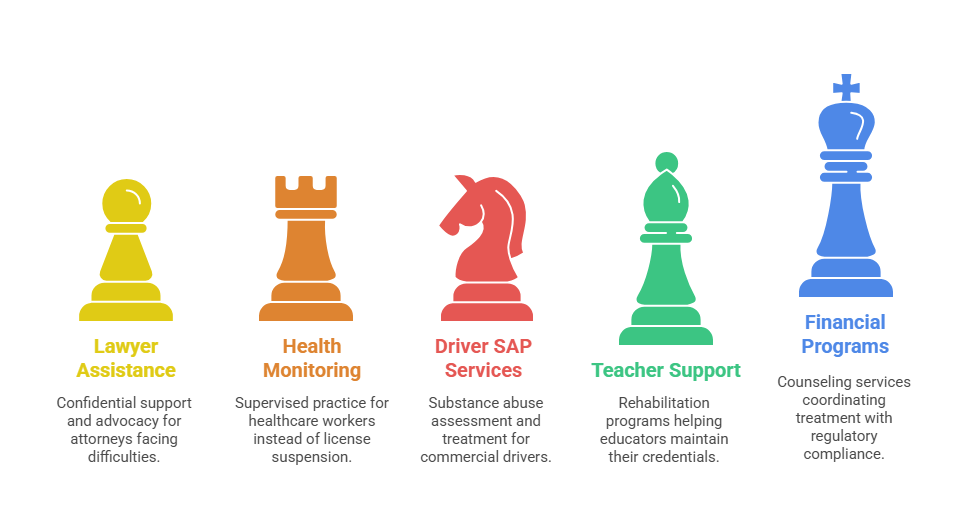
- Lawyer assistance programs: State bar association programs providing confidential support, peer counseling, monitoring agreements, and advocacy with licensing authorities for attorneys.
- Health professional monitoring: State-specific programs for nurses, doctors, pharmacists allowing continued practice under supervised conditions rather than immediate license suspension.
- Commercial driver SAP services: DOT-approved substance abuse professionals assessing drivers and recommending treatment programs meeting federal return-to-duty requirements.
- Teacher support programs: Educational assistance programs helping educators maintain credentials while addressing substance abuse issues through structured rehabilitation.
- Financial industry programs: Securities industry counseling services coordinating treatment with regulatory compliance and employment continuation.
Healthcare professionals benefit from state-specific monitoring programs for impaired practitioners that provide structured rehabilitation while protecting public safety. These programs typically include regular drug testing, attendance at support meetings, workplace monitoring, and periodic reports to licensing authorities.
Financial Assistance for DUI Treatment Programs
Treatment program costs vary significantly based on intensity and duration. Basic court-ordered programs typically range from $500 to $2,000, while intensive outpatient programs can cost $3,000 to $10,000. Understanding available financial assistance options makes comprehensive treatment more accessible regardless of economic circumstances.
Financial assistance options include:
- Health insurance coverage: Mental health parity laws require equal coverage for behavioral health services, with many plans covering substance abuse treatment.
- Sliding scale fees: Treatment facilities offering reduced rates based on income for individuals without insurance or with limited financial resources.
- State-funded programs: Low-cost or free services through state substance abuse agencies for individuals meeting income eligibility requirements.
- Payment plans: Installment options allowing treatment costs to be spread over time rather than requiring full upfront payment.
- Court fee waivers: Some jurisdictions allow community service hours in lieu of treatment fees for defendants demonstrating financial hardship.
- Employer EAP benefits: Employee Assistance Programs often cover initial assessment and limited treatment sessions at no cost to employees.
Many health insurance plans cover substance abuse treatment under mental health parity laws. Review your policy's behavioral health benefits to determine coverage for DUI-related counseling, including deductibles, copayments, and authorization requirements.
Record Expungement and Sealing Options
Expungement removes a conviction from public records as if it never occurred. Eligibility requirements vary by state but typically include completing all sentence terms, maintaining a clean record for a specified period, and demonstrating rehabilitation. Successfully expunged DUI convictions generally don't appear on employment background checks.
Record sealing differs from expungement by restricting access to conviction records rather than eliminating them entirely. Sealed records remain accessible to certain government agencies and licensed professions but are hidden from most private employers. Many states offer sealing options for first-time DUI offenders after 3-10 years with no subsequent violations.
Certificates of rehabilitation provide official recognition of successful recovery efforts even when expungement isn't available. These court-issued documents acknowledge completed treatment, probation, and demonstrated good conduct. Presenting certificates to employers alongside treatment documentation strengthens your case for hiring consideration despite conviction history.
Networking and Professional Relationships After DUI
Building strong professional networks becomes essential for career advancement after DUI convictions. Personal recommendations often carry more weight than formal applications when employers evaluate candidates with criminal histories. These relationships provide opportunities to demonstrate your current capabilities and character while building connections with potential employers.
Networking strategies for career recovery:
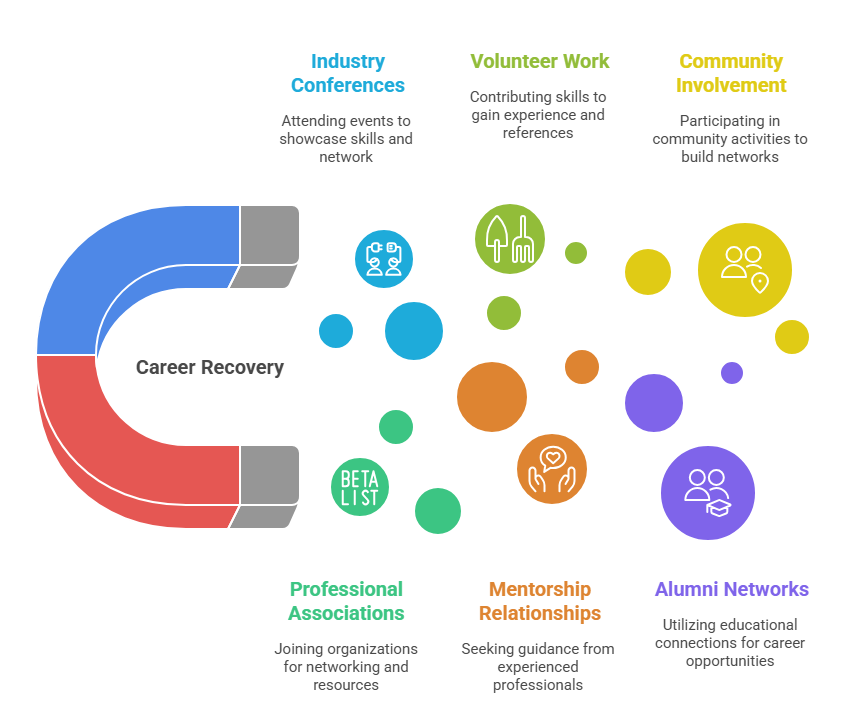
- Industry conferences and events: Attend professional gatherings providing opportunities to demonstrate current skills and build relationships with potential employers or referral sources.
- Professional association membership: Join industry organizations offering networking opportunities, educational resources, and sometimes mentorship programs for members.
- Volunteer work: Contribute skills to nonprofit organizations or professional associations demonstrating continued commitment while building references and recent experience.
- Mentorship relationships: Seek guidance from experienced professionals who understand your industry and can provide honest feedback about addressing convictions.
- Community involvement: Participate in community organizations building diverse networks and demonstrating positive community contributions.
- Alumni networks: Leverage educational institution connections providing built-in professional networks and potential career opportunities.
Mentorship relationships offer valuable guidance for navigating career challenges after DUI convictions. Seek mentors who understand your industry and can provide honest feedback about addressing your conviction in professional contexts.
Continuing Education and Skill Development
Pursuing additional certifications and credentials demonstrates forward momentum and commitment to professional excellence. Industry-recognized certifications show employers that you're investing in your career beyond simply addressing past mistakes. Research certifications valued in your field and create a timeline for completing them.
Online courses and degree programs offer flexible options for skill development while maintaining employment. Platforms like Coursera, LinkedIn Learning, and industry-specific education providers offer courses that can enhance your qualifications. Completing relevant courses shows initiative and keeps your skills current in rapidly changing industries.
Attending workshops and conferences keeps you connected to industry trends and best practices. These educational opportunities provide networking chances while demonstrating your engagement with professional development. Many conferences offer scholarships or reduced rates for members of professional associations.
Conclusion
DUI treatment program completion provides tangible benefits for employment prospects by demonstrating accountability and commitment to rehabilitation. While DUI convictions create legitimate employment challenges across industries, comprehensive documentation of treatment efforts significantly improves hiring outcomes compared to simply fulfilling minimum legal obligations. Strategic career planning after DUI treatment should include thorough documentation gathering, honest but strategic disclosure, continued professional development, and building strong networks of supporters who can vouch for your current character and capabilities. The long-term employment impact of DUI convictions diminishes substantially when individuals proactively address alcohol issues through quality treatment programs and maintain clean records demonstrating sustained recovery.
Frequently Asked Questions
How long does a DUI affect employment opportunities?
A DUI conviction typically impacts employment for 3-10 years depending on industry requirements, position sensitivity, and state regulations governing background checks. Safety-sensitive positions and professional licenses face longer impacts, while general employment concerns diminish significantly after 5 years with clean records. Completing treatment programs and maintaining demonstrated sobriety substantially reduces the timeframe for returning to full employment competitiveness. Research shows employers place significantly less weight on convictions after 3-5 years, especially with documented rehabilitation.
Do I have to tell employers about my DUI?
You must answer truthfully if applications specifically ask about convictions, but you're generally not required to volunteer information if not asked directly. Ban-the-box laws in many states prohibit conviction questions on initial applications, delaying background inquiries until after preliminary interviews. Proactive disclosure during face-to-face interviews often produces better outcomes than waiting for background check results, especially when you can emphasize completed treatment and demonstrated rehabilitation. Legal requirements vary by jurisdiction, so review application questions carefully.
Will completing a DUI program help me keep my professional license?
Yes, documented completion of appropriate treatment programs significantly improves professional license retention and reinstatement prospects across all licensed professions. Most licensing boards require substance abuse evaluations and treatment following alcohol-related convictions, with comprehensive rehabilitation documentation essential for demonstrating fitness to practice. Exceeding minimum treatment requirements and participating in profession-specific monitoring programs further strengthens your position with licensing authorities. Many licensing boards view voluntary treatment beyond court requirements particularly favorably.
Can employers refuse to hire me solely because of a DUI?
Employers may generally consider DUI convictions in hiring decisions if they demonstrate legitimate job-relatedness and business necessity for the specific position. However, EEOC guidelines require individualized assessments considering offense nature, time elapsed since conviction, and rehabilitation evidence rather than blanket exclusion policies. State and local ban-the-box laws further restrict when employers can inquire about convictions and how they use that information in decisions. Most laws ultimately allow consideration of relevant conviction history in final hiring decisions with proper procedures.
What documentation should I get from my DUI treatment program?
Request comprehensive documentation including official completion certificates, detailed attendance records, counselor recommendation letters, and progress evaluation reports from all treatment programs. Ask treatment providers for employment-specific letters addressing workplace concerns like reliability, accountability, and commitment to maintaining sobriety in professional settings. Maintain organized copies of all documentation in a professional portfolio accessible during job applications and interviews. Additional documentation like continuing support participation records and ongoing testing results further demonstrates sustained recovery commitment.
Are certain industries more willing to hire people with DUIs?
Yes, industries with non-safety-sensitive positions and less regulatory oversight generally show more flexibility regarding DUI convictions in hiring decisions. Retail, food service, technology, warehousing, and administrative roles without driving requirements typically face fewer restrictions compared to transportation or healthcare positions. Many large corporations have adopted formal second-chance hiring initiatives specifically welcoming qualified candidates with criminal histories. Entry-level positions often provide more opportunities than roles requiring professional licenses or safety-sensitive duties.
How do I explain my DUI in job interviews?
Prepare a concise 60-90 second explanation that briefly acknowledges the conviction, emphasizes completed treatment and lessons learned, and demonstrates how the experience improved your character and decision-making. Focus on accountability and specific rehabilitation actions taken rather than excuses or excessive detail about circumstances. Practice delivering this explanation confidently with a neutral tone that conveys genuine remorse and growth, then transition quickly to discussing your qualifications and enthusiasm for the position. Frame the experience as evidence of your ability to overcome challenges and make positive changes.
Can I get my DUI expunged to improve employment prospects?
Expungement eligibility varies by state and depends on factors including time elapsed since conviction, completion of all sentence requirements including treatment programs, and subsequent criminal history. Many states allow first-time DUI offenders to petition for expungement or record sealing after 3-10 years with clean records and demonstrated rehabilitation. Successfully expunged records generally don't appear on employment background checks, though exceptions exist for certain licensed professions and government positions requiring complete disclosure. Consult with criminal defense attorneys in your jurisdiction about specific eligibility requirements and procedures.
Does voluntary treatment beyond court requirements help with employment?
Absolutely—voluntary participation in treatment programs beyond minimum legal requirements demonstrates exceptional accountability and commitment to recovery that employers and licensing boards value highly. Employers view voluntary treatment significantly more favorably than simply fulfilling mandatory court obligations since it shows genuine dedication to addressing underlying issues. Additional treatment, ongoing support group participation, and continued monitoring show sincere commitment to maintaining sobriety rather than merely avoiding legal consequences. Research indicates that comprehensive voluntary treatment substantially improves hiring outcomes and professional license reinstatement prospects.
Additional Resources
- EEOC Guidance on Consideration of Arrest and Conviction Records in Employment
https://www.eeoc.gov/laws/guidance/arrest_conviction.cfm - Federal Motor Carrier Safety Administration - Drug and Alcohol Program Requirements
https://www.fmcsa.dot.gov/regulations/drug-alcohol-program-requirements - National Institute on Alcohol Abuse and Alcoholism - Treatment Resources
https://www.niaaa.nih.gov/publications/brochures-and-fact-sheets/treatment-alcohol-problems-finding-and-getting-help - Society for Human Resource Management - Background Checks and Criminal Records
https://www.shrm.org/resourcesandtools/tools-and-samples/toolkits/pages/backgroundchecks.aspx - National HIRE Network - Legal Resources for People with Criminal Records
https://hirenetwork.org/content/resources - Substance Abuse and Mental Health Services Administration - Treatment Locator
https://findtreatment.samhsa.gov/

GCheck Editorial Team
Meet the GCheck Editorial Team, your trusted source for insightful and up-to-date information in the world of employment background checks. Committed to delivering the latest trends, best practices, and industry insights, our team is dedicated to keeping you informed.
With a passion for ensuring accuracy, compliance, and efficiency in background screening, we are your go-to experts in the field. Stay tuned for our comprehensive articles, guides, and analysis, designed to empower businesses and individuals with the knowledge they need to make informed decisions.
At GCheck, we're here to guide you through the complexities of background checks, every step of the way.





